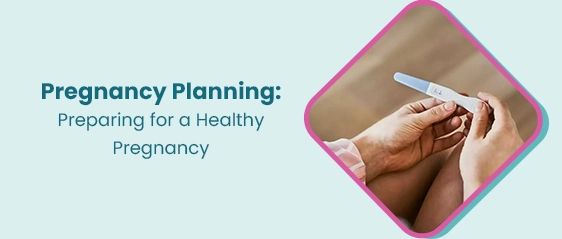
Pregnancy Planning & Preparing for a Healthy Journey
- 14 Aug 2023
The journey to parenthood is an exciting and transformative chapter in life. Pregnancy planning involves more than just conceiving; it's about ensuring the health and well-being of both the expectant mother and the growing baby. In this comprehensive guide, we'll explore the crucial steps to consider when planning for a healthy pregnancy, from preconception care to embracing the journey ahead.
Preconception Care: Laying the Foundation
Understand Your Health: Begin by evaluating your overall health. Address any chronic medical conditions, take necessary vaccinations, and ensure your weight and nutrition are within healthy ranges
- Consult a Healthcare Provider: Schedule a preconception appointment with your healthcare provider. They can assess your health, review medications, and provide guidance on optimizing your health for pregnancy.
- Prenatal Vitamins: Start taking prenatal vitamins containing folic acid at least three months before conception. Folic acid aids in the prevention of birth abnormalities of the baby's brain and spine.
Lifestyle Modifications: Building a Healthy Environment
- Nutrition: A nutritious diet rich in fruits, vegetables, whole grains, lean proteins, and dairy products is beneficial to both you and your kid. Caffeine should be avoided, as should alcohol and certain high-mercury seafood.
- Exercise: Participate in frequent physical activity that is appropriate for your fitness level. Walking, swimming, and prenatal yoga can promote strength, flexibility, and overall well-being.
- Manage Stress: Stress reduction techniques like meditation, deep breathing, and relaxation exercises contribute to a positive pregnancy journey.
Understand Your Menstrual Cycle: Timing Matters
- Ovulation Tracking: Understand your menstrual cycle and track ovulation to identify your fertile window, increasing the chances of conception.
- Fertility Apps: Utilize fertility tracking apps or Ovulation prediction kits can be used to determine the best time to conceive.
Healthy Habits for Both Partners: Teamwork for Success
- Partner's Health: Remember that the health of both partners contributes to a successful pregnancy. Encourage your partner to adopt healthy habits as well.
- Quit Smoking: If either partner smokes, quitting is crucial. Smoking can harm fertility and pose risks to the baby's health during pregnancy
Medical History and Genetic Screening: Informed Decision-Making
- Genetic Counseling: Consider genetic counseling, especially if you have a family history of genetic conditions. This helps you understand potential risks and make informed choices.
- Screening Tests: Undergo necessary tests for sexually transmitted infections (STIs), immunity to diseases, and any other conditions that might impact your pregnancy.
Mental and Emotional Well-being: Nurturing a Positive Mindset
- Support System: Surround yourself with a strong support system of family and friends who can offer encouragement and guidance.
- Seek Help: If you have a history of mental health conditions, seek professional help to ensure your emotional well-being during pregnancy.
Financial and Practical Preparedness: Planning Ahead
- Insurance Coverage: Review your health insurance policy to understand the coverage for prenatal care and childbirth.
- Budgeting: Plan your finances, considering the costs of prenatal care, medical visits, birthing classes, and baby essentials.
Prepare for a Healthy Pregnancy: Embrace the Journey
- Regular Check-ups: Once you conceive, schedule regular prenatal check-ups with your healthcare provider to monitor your health and the baby's development.
- Education: Attend prenatal classes to learn about childbirth, breastfeeding, and newborn care.
- Nutrition: Continue to eat a balanced diet and take prenatal vitamins as recommended by your healthcare provider.
- Exercise: Modify your exercise routine to ensure safety and engage in activities recommended for pregnant women.
Conclusion
Pregnancy planning is a thoughtful and proactive process that sets the stage for a healthy and fulfilling journey to parenthood. By prioritizing your health, making necessary lifestyle adjustments, understanding your menstrual cycle, addressing medical history, and preparing both physically and emotionally, you can ensure the best possible start for your baby. Ask our Gynecologists for the best guidance. Embrace this incredible chapter with the knowledge that you're taking all the right steps for a safe and joyous pregnancy experience.
Frequently Asked Questions
1. Why is pregnancy planning important?
Pregnancy planning ensures that you and your baby are in the best possible health before conception. It involves making lifestyle changes, addressing medical concerns, and creating a supportive environment for a healthy pregnancy.
2. When should I start preconception care?
It's ideal to start preconception care at least three months before trying to conceive. This gives you time to optimize your health, address any medical issues, and begin taking prenatal vitamins
3. What should I include in my preconception care appointment?
During a preconception appointment, your healthcare provider will review your medical history, update vaccinations, discuss medications, and provide advice on nutrition, exercise, and supplements.
4. What role does nutrition play in pregnancy planning?
Nutrition is crucial as it provides the necessary nutrients for a healthy pregnancy. A balanced diet rich in vitamins, minerals, & protein supports your well-being and the baby's development.
5. Can I exercise during pregnancy planning?
Yes, regular exercise is beneficial during pregnancy planning. Engaging in low-impact activities like walking and prenatal yoga can improve fitness and overall health.
6. How can I track my ovulation for pregnancy planning?
You can track ovulation through methods like basal body temperature charting, cervical mucus monitoring, or using ovulation predictor kits. These help identify your fertile window for conception.
7. Is genetic screening necessary before pregnancy?
Genetic screening is recommended, especially if you have a family history of genetic conditions. It helps you understand potential risks and make informed decisions.
8. What should I do to ensure my partner's health during pregnancy planning?
Encourage your partner to adopt a healthy lifestyle, quit smoking if necessary, and consider preconception check-ups to address any medical concerns.
9. Can stress affect pregnancy planning?
High levels of stress can impact fertility and overall health. Incorporating stress-reduction techniques like meditation and relaxation exercises can be beneficial.
10. How soon after stopping birth control can I start trying to conceive?
The time it takes for your menstrual cycle to regulate after stopping birth control varies. It's advisable to wait for a couple of regular cycles before actively trying to conceive
11. What should I do if I have a history of mental health conditions?
If you have a history of mental health conditions, consult with a mental health professional before and during pregnancy. They can help you manage your emotional well-being.
12. Is financial preparedness important for pregnancy planning?
Yes, financial preparedness is crucial. Plan for medical costs, prenatal care, birthing classes, and baby essentials. Review your health insurance to understand coverage.
13. Can I exercise during pregnancy?
Yes, exercise is generally safe and beneficial during pregnancy. Consult your healthcare provider for guidance on suitable exercises and modifications as your pregnancy progresses
14. How often should I have prenatal check-ups during pregnancy?
Prenatal check-up frequency depends on your healthcare provider's recommendations and your specific needs. Generally, these appointments are scheduled monthly until the third trimester when they become more frequent.
15. Can I continue taking prenatal vitamins during pregnancy?
Yes, prenatal vitamins are essential throughout pregnancy to ensure you're getting vital nutrients. Consult your healthcare provider to ensure you're taking the right dosage and type




